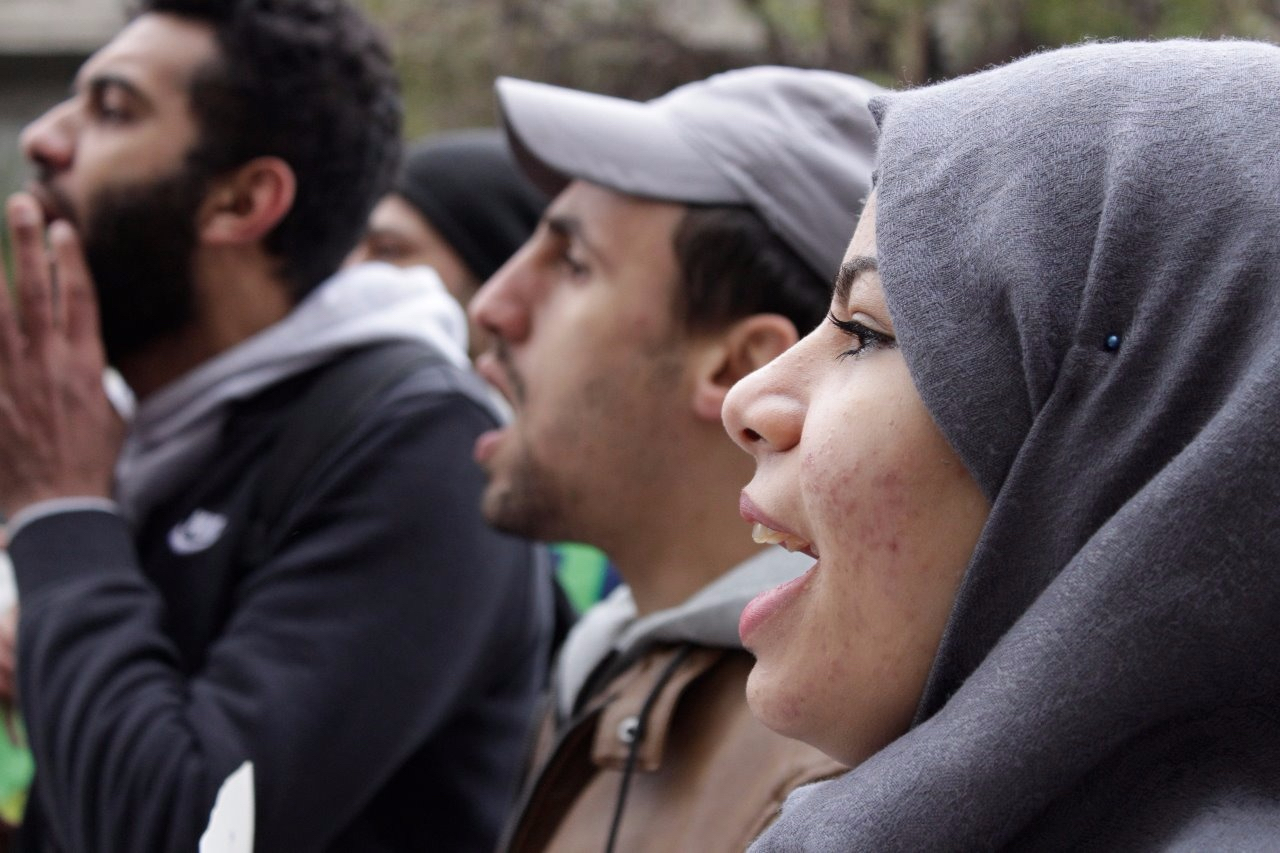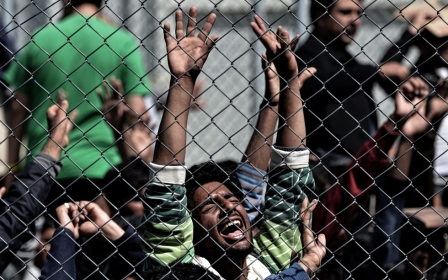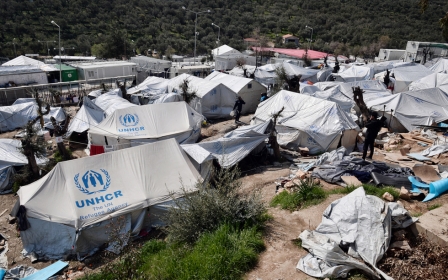Syrian refugees live in fear as Greece prepares to take some off housing support

Syrian refugee Zharaa al-Juma says she's living in constant anxiety, after the Greek government announced plans to limit the amount of time newcomers have access to a critical housing assistance programme.
The support has been a lifeline for al-Juma's family, which fled Deir Ezor in eastern Syria in 2015 for Turkey and eventually reached Greece in 2017.
"What can I do if they kick me out with my family?" the 17-year-old told Middle East Eye in a telephone interview from Athens, where she lives with her parents and five siblings.
"What can I do? I have to maybe sleep in the street."
Al-Juma and her family are among several refugees who fear they will be forced to leave their homes amid the Greek government's recent decision to enforce a policy that dates back to 2017.
New MEE newsletter: Jerusalem Dispatch
Sign up to get the latest insights and analysis on Israel-Palestine, alongside Turkey Unpacked and other MEE newsletters
That policy states that any person with refugee status or subsidiary protection living in Greece for more than six months should be gradually cut off from a subsidised housing programme known as the Emergency Support to Integration and Accommodation programme (ESTIA).
ESTIA provides vulnerable asylum seekers and refugees with access to housing, cash, and other support services. By the end of February, more than 22,800 people were accommodated in ESTIA apartments or other buildings across Greece.
Right now, most of the rent-free housing offered to refugees and asylum seekers is in the Athens area, while about 6,300 of current ESTIA recipients are recognised as refugees, according to the United Nations refugee agency (UNHCR).
The al-Jumas, for example, live in Athens in one of the state-subsidised homes.
The removals from ESTIA housing are expected to be carried out in phases, with the first round affecting refugees who received their status before August 2017, a spokesman for the Greek Ministry of Migration Policy, Alexis Bouzis, told MEE.
Bouzis and Boris Cheshirkov, a spokesman for UNHCR in Greece, said more than 200 refugees may be affected during this first phase. Cheshirkov didn't say how many other refugees or asylum seekers may be subjected to the removals at later dates.
While some refugees are pleading for more time to become self-sufficient, Greek and UN officials say that cutting off the subsidies will accelerate the newcomers' integration into society.
Those who agree to leave ESTIA housing will get priority access to special integration training programmes, with the goal of helping them gain access to the Greek labour market through vocational training, Bouzis said.
They will also be entitled to the same social welfare programmes and benefits as Greek citizens.
"We consider that to be a step forward for their integration into Greek society," Bouzis said.
"They have to become independent. They have to become citizens. They have to take their lives in their own hands and they have to stand on their feet and we are doing that and we hope this will work."
Vulnerable refugees given more time
But al-Juma says losing her current home in the Greek capital would be devastating. Her father is blind and struggles to find work, while she and other members of her family have struggled to find jobs because of their age and refugee status.
They survive on the cash assistance and housing provided by the government, al-Juma said.
"We are waiting and we don't know anything," she said.
"We're so nervous because tomorrow, what is going to happen? After tomorrow, one week, two weeks, one month, two months? We don't know where we're going to be."
Still, the Greek government and UNHCR insist the government’s policy will help refugees better integrate into Greek society.
'We're so nervous because tomorrow, what is going to happen? After tomorrow, one week, two weeks, one month, two months? We don't know where we're going to be'
-Zharaa al-Juma, Syrian refugee in Athens
Bouzis, the ministry spokesman, said most of the refugees who will be moved out of ESTIA housing were granted asylum in Greece almost two years ago.
He also told MEE that refugees in extremely vulnerable situations - those who are sick, pregnant, have young children or family members enrolled in school, among others - would be given more time to leave their state-subsidised homes.
"Many of them have had asylum for more than 20 months and we are excluding people who are in vulnerable situations," he said.
Refugees mobilise
But the decision to cut housing assistance hasn’t come without opposition. In fact, it has caused serious concerns among refugees and their advocates.
Mohammad Wael, who previously worked with an NGO that supports refugees in Greece, said when he was ordered to tell refugees that they would have to leave their homes, he resigned from his job in protest.
"Me, as a Palestinian, born as a Palestinian refugee, I said, 'Sorry, but I withdraw and I refuse to do this,'" he told MEE.
"It's not fair. They are bringing back this issue to the people to blame them and telling them that, 'You are not willing to integrate … this is your problem, not our problem.'"
After the government said it would implement the first phase of its policy earlier this year, Wael formed the Refugees Movement for Rights and Justice, an advocacy group.
The group's goal is to take a stand against what it describes as the Greek government's "racist decisions". On 13 March, they organised a protest in front of the European Union building in Athens.
Influx of refugee arrivals
The situation has highlighted Greece’s ongoing struggle to accommodate and provide support for tens of thousands of refugees, many of whom arrived on boats from Turkey in recent years and continue to live in refugee camps on the islands.
Last year alone, more than 50,000 new refugees arrived in Greece. Between the start of 2019 and 10 March, more than 6,000 refugees arrived in the country, UNHCR estimates, putting the total number of refugees in Greece at more than 60,000.
Against that backdrop, UNHCR's Cheshirkov said the government's decision to get refugees off the ESTIA programme aims to help bring more refugees living in overcrowded camps to the Greek mainland, where resources and housing options are more readily available.
"Two-hundred places can make a substantial difference for people who are in an extremely difficult situation," Cheshirkov told MEE in a telephone interview.
He also said allowing refugees to rely on ESTIA assistance "for an indefinite period of time" is not sustainable. "It's not encouraging people to become self-sufficient. It's not helping integration," he said.
That hasn't calmed al-Juma's fears. Still, she told MEE she has hope that the government will reverse its decision. "I feel so sad, not about me or my family, but because there are too many people living here who need that money," she said.
"I hope something will change and that they will stop this decision because if they continue with this, I am worried [about] what will happen to the people."
Middle East Eye delivers independent and unrivalled coverage and analysis of the Middle East, North Africa and beyond. To learn more about republishing this content and the associated fees, please fill out this form. More about MEE can be found here.





